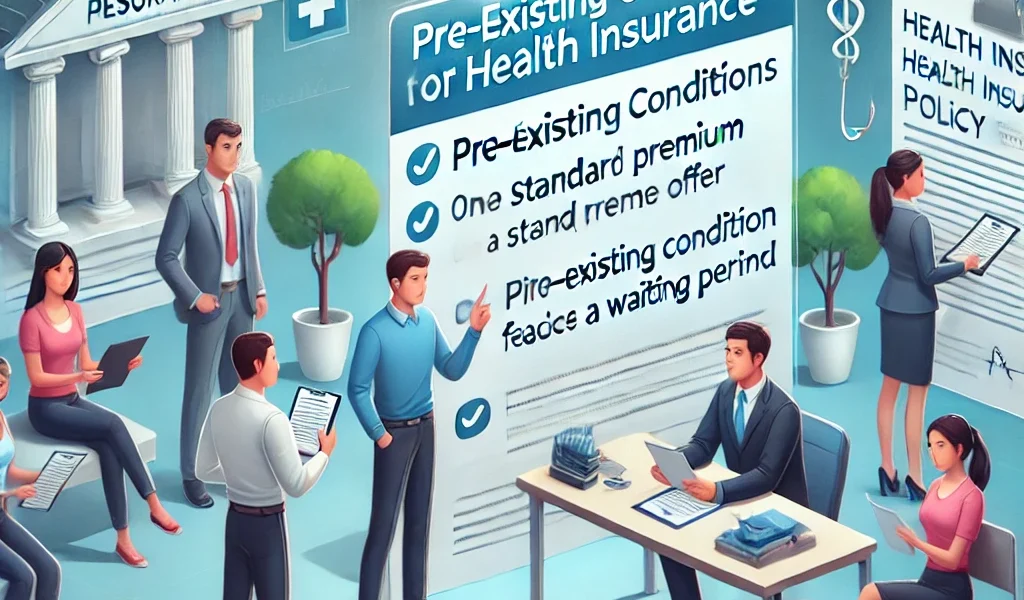Health insurance is a crucial financial safety net that helps cover medical expenses. However, if you have a pre-existing condition, filing a health insurance claim can be more complicated. Understanding how pre-existing conditions affect your health insurance claims can help you navigate the process effectively and avoid claim rejections.
In this guide, we will explore the impact of pre-existing conditions on health insurance claims, strategies to ensure a hassle-free claims process, and important legal protections for policyholders.
What Is a Pre-existing Condition?
A pre-existing condition is any illness, injury, or health issue diagnosed before the start of a health insurance policy. Common examples include:
- Diabetes
- Hypertension
- Asthma
- Heart disease
- Cancer
- Thyroid disorders
- Chronic kidney disease
Insurance companies consider these conditions when evaluating claims, as they may pose a higher risk of medical expenses.
How Do Pre-existing Conditions Affect Health Insurance Claims?
Pre-existing conditions can impact health insurance claims in several ways:
1. Waiting Periods
- Most health insurance policies have a waiting period (typically 2-4 years) before covering treatment for pre-existing conditions.
- During this time, any claims related to the pre-existing condition will be rejected.
- Some insurers offer reduced waiting periods for an additional premium.
2. Higher Premiums
- If you have a pre-existing condition, insurers may charge higher premiums due to increased health risks.
- Premium rates depend on the severity and history of the condition.
3. Claim Rejections or Exclusions
- Some policies permanently exclude coverage for specific pre-existing conditions.
- If you do not disclose your condition when buying a policy, claims may be denied due to non-disclosure or misrepresentation.
4. Limited Coverage for Specific Treatments
- Certain policies may cover pre-existing conditions but limit the coverage for related treatments or medications.
- Insurers may impose sub-limits or co-payment clauses for expensive treatments like dialysis or chemotherapy.
How to Ensure a Smooth Health Insurance Claim with a Pre-existing Condition
1. Choose a Policy with a Short Waiting Period
- Compare policies and opt for one with a shorter waiting period for pre-existing conditions.
- Some insurers offer policies with a zero waiting period at a higher premium.
2. Disclose All Health Conditions Honestly
- Always declare pre-existing conditions when buying a policy.
- Providing false information or omitting details can result in claim rejection.
3. Understand the Terms of Your Policy
- Read your policy documents carefully to understand:
- Waiting periods
- Exclusions
- Co-payment clauses
- Coverage limits
4. Opt for Portability if Necessary
- If your current policy has unfavorable terms, consider porting to another insurer with better coverage.
- Under IRDAI (Insurance Regulatory and Development Authority of India) guidelines, you can port a policy without losing accrued benefits.
5. Maintain a Comprehensive Medical Record
- Keep records of:
- Medical history
- Doctor prescriptions
- Diagnostic reports
- Previous insurance claims
- This documentation will help support your claim and prevent delays.
6. Consult Your Insurer Before Treatment
- If you need hospitalization, check with your insurer whether the treatment is covered.
- Obtain pre-authorization for cashless claims at network hospitals.
7. Opt for Top-Up or Super Top-Up Plans
- If your existing policy has limited coverage, consider purchasing top-up or super top-up plans.
- These plans help cover excess medical expenses beyond your base policy’s coverage limit.
Legal Protections for Policyholders with Pre-existing Conditions
1. IRDAI Guidelines on Pre-existing Conditions
- Insurers in India cannot deny coverage due to pre-existing conditions.
- They must specify the waiting period and coverage terms upfront.
2. Affordable Care Act (ACA) in the U.S.
- The ACA prohibits insurers from denying coverage or charging higher premiums due to pre-existing conditions.
- Policies must cover essential health benefits without discrimination.
3. HIPAA (Health Insurance Portability and Accountability Act)
- Ensures continuity of coverage when switching jobs or insurers.
- Prevents insurers from imposing extended waiting periods on new policies.
Common Mistakes to Avoid
1. Not Disclosing Pre-existing Conditions
- Failure to disclose can result in claim denial and policy cancellation.
2. Buying a Policy Without Checking the Waiting Period
- Always verify the waiting period for pre-existing conditions before purchasing.
3. Ignoring Policy Exclusions
- Read the fine print to understand what treatments are excluded from coverage.
4. Delaying Policy Renewal
- Lapse in policy renewal can lead to loss of waiting period benefits.
5. Not Keeping Medical Records
- Insufficient documentation can lead to delays or claim rejections.
Frequently Asked Questions (FAQs)
Q1: Can I get health insurance if I have a pre-existing condition?
Yes, but coverage for pre-existing conditions may be subject to waiting periods or exclusions.
Q2: How long is the waiting period for pre-existing conditions?
Typically, 2-4 years, but some insurers offer shorter waiting periods for an additional premium.
Q3: Will my claim be rejected if I did not disclose my condition?
Yes, non-disclosure of pre-existing conditions can result in claim denial and policy cancellation.
Q4: Can I switch insurers to get better coverage for my condition?
Yes, you can port your policy to another insurer while retaining benefits like the waiting period credit.
Q5: Do group health insurance policies cover pre-existing conditions?
Yes, many employer-sponsored group health policies offer coverage without waiting periods.
Final Thoughts
Pre-existing conditions can make health insurance claims more challenging, but proper planning can help you secure coverage and get your claims approved smoothly. By understanding waiting periods, policy terms, and legal protections, you can make informed decisions and avoid common pitfalls.
Always choose a policy with favorable terms, disclose your medical history truthfully, and keep all necessary documentation handy. Taking these proactive steps will ensure you get the best possible coverage and avoid unnecessary claim rejections.
By following this guide, you can navigate health insurance claims confidently and maximize the benefits of your policy.




